Dick Harrison
The Era of Evil
The Development of Witch Persecutions and Trials in Europe from the Middle Ages to the Eighteenth century
Fimmtudaginn 19. febrúar 2026 kl. 16.30 / Thursday, February 19, 2026, at 16.30
Fyrirlestrasal Eddu (E-103) / Edda auditorium (E-103)
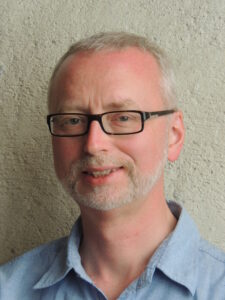
In the early Middle Ages, the Christian church of Europe regarded magic in much the same way that we do today. It was regarded as superstition, as a bundle of ideas that should be combatted not because they could result in real harm, but because they were stupid. Since all power emanated from God, the very notion that Satan or one of his demons could be called upon to render assistance to witches and wizards was nonsense. Hence, witches and wizards were not taken seriously, and they could be (and were) used in stories and plays as elements of entertainment.
However, in the late thirteenth and early fourteenth century, this attitude began to change. In the 1320s, the pope himself acknowledged that magic users should be taken seriously, for the same reason that heretics were to be feared. Since heretics—i.e., Cathars and Valdensians—did exist and, moreover, caused serious harm to Christianity, it was only logical to assume that they were inspired by Satan and the forces of evil. In all probability, these dark powers also tried to exert influence over the world by employing witches and wizards. Accordingly, practitioners of magic were to be dealt with in the same fashion as heretics: by investigations and persecutions and, as a last resort, by burning at the stake.
This was the beginning of a development that created an atmosphere of fear of magic that resulted in sporadic eruptions of witch hunts. Eventually, tens of thousands of innocent Europeans were tried and killed, with a culmination in the seventeenth century. The processes varied considerably: for example, the vast majority of the victims in continental Europe were women, while the majority of the Icelandic victims were men. In present-day Estonia and Latvia, there were few witch trials but many werewolf trials. In Spain, some of the biggest persecutions of the era were launched, but they were quenched by the Inquisition, since this well-trained ecclesiastical court demanded reliable pieces of evidence. In Sweden, on the other hand, many women were condemned to death simply because local children made up stories about their alleged visits to Blåkulla, where they were supposed to have made pacts with the Devil.
How was this possible? Why did learned intellectuals embrace popular ideas that had previously been regarded as ludicrous? And why did the witch craze stop? What made judges, priests and princes realise that the accused were innocent?
Dick Harrison is Professor of History at Lund University in Sweden. He has published more than a hundred books on various historical subjects, with a major focus on the Middle Ages. His book about the Black Death was rewarded the August Prize for best Swedish non-fiction book in 2000, and he was the editor (and a major contributor) to the eight-volume work Sveriges historia (“The History of Sweden”). Harrison appears frequently as an expert in Swedish radio and television.
Fyrirlesturinn verður haldinn á ensku og er öllum opinn. / The talk will be delivered in English and is open to all.
—o—o—o—
Helgi Þorláksson
Klofasteinar fyrir norðan
Geta klofasteinar sagt eitthvað um landnám Íslands og þá hvað helst?
Fimmtudaginn 5. febrúar 2026 kl. 16.30 / Thursday, February 5, 2026, at 16.30
Fyrirlestrasal Eddu (E-103) / Edda auditorium (E-103)
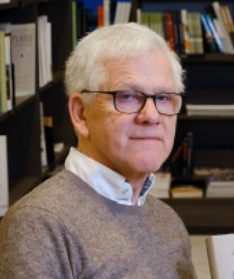
Fyrirlesari birti grein árið 2023 þar sem settar eru fram ábendingar um að stórtækir landnámsmenn á Íslandi muni hafa getað ákveðið hvar mörk skyldu vera milli svæða eða stórra jarða sem þeir námu og útdeildu. Vísbendingar um þetta taldi fyrirlesari vera allstóra, klofna steina, svonefnda klofasteina, á mörkum á Suðurlandi, suðvesturhorni landsins og í Borgarfirði, alls 34 dæmi. Hann rökstuddi að steinarnir hefðu iðulega fengið þetta hlutverk á elstu tíð. Fyrirlesari ber núna saman við 39 klofasteina á mörkum í þremur sýslum nyrðra, Húnavatnssýslu, Skagafjarðarsýslu og Eyjafjarðarsýslu.
Helgi Þorláksson er prófessor emeritus í sagnfræði við Háskóla Íslands. Hann fékkst í kennslu og rannsóknum einkum við Íslands- og Norðurlandasögu frá um 900 til um 1800, svið pólitískrar sögu, félagssögu og hagsögu. Doktorsritgerð hans fjallar um hagsögu Íslands á 13. og 14. öld og náin tengsl við Noreg.
Fyrirlesturinn verður haldinn á íslensku og er öllum opinn. / The talk will be delivered in Icelandic and is open to all.
Helgi Þorláksson
Klofasteinar fyrir norðan
Geta klofasteinar sagt eitthvað um landnám Íslands og þá hvað helst?
Fimmtudaginn 27. nóvember 2025 kl. 16.30 / Thursday, November 27, 2025, at 16.30 AFLÝST VEGNA VEIKINDA
Fyrirlestrasal Eddu (E-103) / Edda auditorium (E-103)

Fyrirlesari birti grein árið 2023 þar sem settar eru fram ábendingar um að stórtækir landnámsmenn á Íslandi muni hafa getað ákveðið hvar mörk skyldu vera milli svæða eða stórra jarða sem þeir námu og útdeildu. Vísbendingar um þetta taldi fyrirlesari vera allstóra, klofna steina, svonefnda klofasteina, á mörkum á Suðurlandi, suðvesturhorni landsins og í Borgarfirði, alls 34 dæmi. Hann rökstuddi að steinarnir hefðu iðulega fengið þetta hlutverk á elstu tíð. Fyrirlesari ber núna saman við 39 klofasteina á mörkum í þremur sýslum nyrðra, Húnavatnssýslu, Skagafjarðarsýslu og Eyjafjarðarsýslu.
Helgi Þorláksson er prófessor emeritus í sagnfræði við Háskóla Íslands. Hann fékkst í kennslu og rannsóknum einkum við Íslands- og Norðurlandasögu frá um 900 til um 1800, svið pólitískrar sögu, félagssögu og hagsögu. Doktorsritgerð hans fjallar um hagsögu Íslands á 13. og 14. öld og náin tengsl við Noreg.
Fyrirlesturinn verður haldinn á íslensku og er öllum opinn. / The talk will be delivered in Icelandic and is open to all.
—o—o—o—
Martin Roček
From String to Meaning
Applying Semantic AI to Find Textual Similarities Between Medieval Dreambooks in Bohemia
Fimmtudaginn 6. nóvember 2025 kl. 16.30 / Thursday, November 6, 2025, at 16.30
Fyrirlestrasal Eddu (E-103) / Edda auditorium (E-103)

This talk discusses the application of a custom-trained Artificial Intelligence model for the semantic analysis of medieval Latin texts, using a corpus of Somniale Danielis (Dreambook of Daniel) manuscripts as a case study. Traditional digital philological tools are often limited to lexical or string-level comparisons, failing to identify passages with similar meaning but different wording. To address this “semantic gap,” I developed “Scribtum,” a workspace powered by a custom Sem-BERT model fine-tuned on a Latin corpus. This model is designed to generate contextual sentence embeddings, allowing for a nuanced comparison of semantic similarity.
The methodology was tested by comparing several medieval manuscripts of the Somniale Danielis. The AI demonstrated high efficacy, correctly identifying 58 out of 59 identical dream interpretations across the manuscripts, a task that is significantly more time-consuming through traditional manual analysis.
However, the study also highlights the inherent limitations of such models, including biases derived from training data and the challenge of distinguishing subtle semantic nuances, which requires further validation. The conclusion is that while AI cannot replace the critical judgment of a researcher, it serves as a powerful and efficient assistant for the initial large-scale analysis of manuscript corpora, accelerating the identification of textual variants and potential filiations.
Martin Roček is a researcher affiliated with both the Institute for Medieval Research (IMAFO) at the Austrian Academy of Sciences and the Faculty of Arts at Charles University, where he received his PhD in 2025. His doctoral dissertation, “Unraveling the Contaminated Tradition: Medieval Dreambooks in Bohemical Manuscripts,” laid the groundwork for his current research. He now focuses on the field of Digital Humanities, specifically investigating how thoughtful design can make digital tools and applications more approachable and effective for academic use.
Fyrirlesturinn verður haldinn á ensku og er öllum opinn. / The talk will be delivered in English and is open to all.
—o—o—o—
Már Jónsson
Ný útgáfa Grágásar
Fimmtudaginn 30. október 2025 kl. 16.30 / Thursday, October 30, 2025, at 16.30
Fyrirlestrasal Eddu (E-103) / Edda auditorium (E-103)
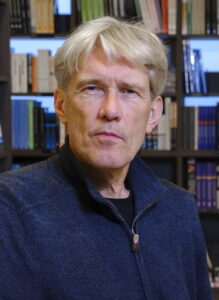
Hið íslenzka fornritafélag áformar að á aldarafmæli þess árið 2028 komi á markað útgáfa á íslenskum lögum miðalda í þremur bindum. Í þriðja bindinu verða Járnsíða, kristinréttur Árna Þorlákssonar og Jónsbók ásamt helstu réttarbótum og fáeinum öðrum skjölum. Grágásarhandritin tvö, Konungsbók (GKS 1154 fol.) og Staðarhólsbók (AM 334 fol.), verða gefin út hvort í sínu bindi ásamt varðveittum skinnbókarbrotum. Útgefendur eru Patricia Pires Boulhosa og Már Jónsson. Í erindinu verður Grágásarútgáfunni lýst og helstu úrlausnarefni reifuð, með hliðsjón af fyrri útgáfum hins mikla lagasafns.
Már Jónsson er prófessor í sagnfræði og sérhæfir sig í útgáfu eldri texta, ekki hvað síst réttarheimilda. Nýjust bóka er Þessi frægu glæpamál. Morðin á Sjöundá og Illugastöðum (2024) í samvinnu við Jón Torfason. Núna vinnur Már að nýrri útgáfu miðaldalaga eins og hann lýsti í greininni „Ný útgáfa íslenskra miðaldalaga,“ Tímarit lögfræðinga 74:4 (2023), bls. 775-813.
Fyrirlesturinn verður haldinn á íslensku og er öllum opinn. / The talk will be delivered in Icelandic and is open to all.
—o—o—o—
Ryder C. Patzuk-Russell
The Masterpiece of Einarr Hafliðason
Reading Lárentíus saga in its Historical Context
Fimmtudaginn 16. október 2025 kl. 16.30 / Thursday, October 16, 2025, at 16.30
Fyrirlestrasal Eddu (E-103) / Edda auditorium (E-103)
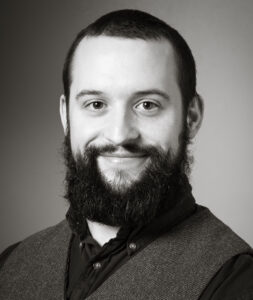
The historical significance of Einarr Hafliðason’s Lárentíus saga has long been understood, in the basic fact that it is the only saga which describes people and events in fourteenth-century Iceland. Nonetheless, it remains a little-read text, and scholarship is only just beginning to fully understand the unique perspective it provides on Icelandic culture, literature, and history. Einarr Hafliðason, who spent many decades as one of the most powerful priests in northern Iceland, was among the most influential and interesting Icelandic figures of the 1300s, not least because of his authorship of a biography of his mentor. With a narrative beginning in the 1260s, written by Einarr around a century later, and preserved in manuscripts from the end of the Middle Ages, Lárentíus saga looks back on the dawn of the Late Middle Ages with a significant amount of hindsight.
This lecture will explore what we can understand by reading Lárentíus saga from the perspective of its author, not only as the young student and deacon he is in the saga, but as the wise and weathered priest and politician he became, looking back on his youth in light of the many turbulent events of the mid-fourteenth-century in northern Iceland. It will tentatively suggest that the saga is not a story of the slow consolidation of a stabilizing Church in Hólar diocese after the tumult of the late thirteenth century, but rather a reflection on the continuing tensions, power shifts, and political upheavals which Einarr experienced over the course of his long career.
Ryder C. Patzuk-Russell is a member of the Centre for Nordic and Old English Studies at the University of Silesia in Katowice. He completed a PhD at the University of Birmingham in 2017 under Chris Callow, and his first monograph, The Development of Education in Medieval Iceland, was released in 2021 and is available open access. He is a specialist in medieval Icelandic history and culture, focusing on the Church, education and schools, and the Late Middle Ages. He is in the process of publishing a new English language translation of Lárentíus saga.
Fyrirlesturinn verður haldinn á ensku og er öllum opinn. / The talk will be delivered in English and is open to all.
—o—o—o—
Stjórnspeki Snorra Sturlusonar
The political philosophy of Snorri Sturluson
Þriðjudaginn 23. september 2025 kl. 16.30–18.00
Tuesday, September 23, 2025, at 16.30–18.00
Fyrirlestrasal Eddu (E-103) / Edda auditorium (E-103)
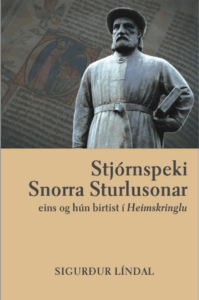 Fundur Miðaldastofu í samstarfi við Hið íslenska bókmenntafélag og RSE, Rannsóknamiðstöð um samfélags- og efnahagsmál, í fyrirlestrasal Eddu 23. september 2025 (á dánardegi Snorra Sturlusonar) kl. 16.30–18.00. Tilefnið er útgáfa á riti prófessors Sigurðar Líndals, Stjórnspeki Snorra Sturlusonar eins og hún birtist í Heimskringlu, en það var upphaflega ritgerð í Úlfljóti 2007. Prófessor Ditlev Tamm mun ræða um réttarsögu Norðurlanda og framlag Sigurðar Líndals til hennar. Dr. Tom G. Palmer mun ræða um Snorra Sturluson frá sjónarmiði nútíma frjálshyggjumanns. Á eftir erindum þeirra verða umræður og á milli kl. 18 og 19 móttaka á staðnum fyrir fundargesti. Garðar Gíslason, fyrrv. hæstaréttardómari, stjórnar umræðum.
Fundur Miðaldastofu í samstarfi við Hið íslenska bókmenntafélag og RSE, Rannsóknamiðstöð um samfélags- og efnahagsmál, í fyrirlestrasal Eddu 23. september 2025 (á dánardegi Snorra Sturlusonar) kl. 16.30–18.00. Tilefnið er útgáfa á riti prófessors Sigurðar Líndals, Stjórnspeki Snorra Sturlusonar eins og hún birtist í Heimskringlu, en það var upphaflega ritgerð í Úlfljóti 2007. Prófessor Ditlev Tamm mun ræða um réttarsögu Norðurlanda og framlag Sigurðar Líndals til hennar. Dr. Tom G. Palmer mun ræða um Snorra Sturluson frá sjónarmiði nútíma frjálshyggjumanns. Á eftir erindum þeirra verða umræður og á milli kl. 18 og 19 móttaka á staðnum fyrir fundargesti. Garðar Gíslason, fyrrv. hæstaréttardómari, stjórnar umræðum.
A symposium hosted by the University of Iceland Centre for Medieval Studies (Miðaldastofa Háskóla Íslands) in collaboration with the Icelandic Literary Society (Hið íslenska bókmenntafélag) and The Centre for Social and Economic Research (Rannsóknamiðstöð um samfélags- og efnahagsmál, RSE) September 23, 2025 (Snorri Sturluson’s death day), in the auditorium in Edda (E-103) at 16.30-18.00. The symposium is to celebrate the re-issue of the late professor Sigurður Líndal’s work, Stjórnspeki Snorra Sturlusonar eins og hún birtist í Heimskringlu, which originally appeared in Úlfljótur in 2007. Professor Ditlev Tamm will discuss Scandinavian legal history and Sigurður Líndal’s contributions to the field. Tom G. Palmer will talk about Snorri Sturluson from the point of view of a modern libertarian. Their presentations will be followed by general discussion, and light refreshments will be served. Supreme Court Judge Emeritus Garðar Gíslason will chair the symposium.
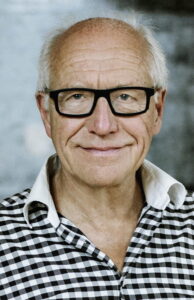
Ditlev Tamm
With the law the land shall be built: King, people, law, and parliaments in the Nordic legal tradition
The Nordic countries today share democratic values and welfare-state mentality. Similarities between the Nordic countries are often stressed. However, different roads have led to present day conditions. Starting with the medieval period that interested Sigurður Líndal, I will reflect on the history of the main Nordic institutions of democracy, on Nordic attitudes towards absolutism and democratic traditions and the historical differences which mark the Nordic liberal legal tradition.
Ditlev Tamm (f. 1946) lauk doktorsprófum í lögfræði frá Kaupmannahafnarháskóla 1977 og í sagnfræði frá Háskólanum í Óðinsvéum 1984. Hann kenndi réttarsögu og aðrar greinar í lagadeild Kaupmannahafnarháskóla frá 1978 og er nú prófessor emeritus. Voru þeir Sigurður Líndal góðir kunningjar. Tamm situr í fulltrúaráði hugveitunnar CEPOS í Kaupmannahöfn Hann hefur birt fjölda bóka á fræðasviði sínu, meðal annars Rettens rødder – hvordan lov og ret har skabt Danmark (2022), Konseilspræsidenten – Jacob Brønnum Scavenius Estrup – 1825-1913 (1996) og Retsopgøret efter besættelsen (1984).
Ditlev Tamm (b. 1946) has a doctoral degree in law from the University of Copenhagen (1977) and in history from the University of Odense (1984). He taught legal history and related subjects in the University of Copenhagen Law School from 1978 and is now professor emeritus. The late Sigurður Líndal and he were good friends. Tamm is a member of the CEPOS think tank in Copenhagen. He has published several books, including Rettens rødder – hvordan lov og ret har skabt Danmark (2022), Konseilspræsidenten – Jacob Brønnum Scavenius Estrup – 1825-1913 (1996), and Retsopgøret efter besættelsen (1984).
Tom G. Palmer
Deliberation, Liberty, and Democracy: Comments on Sigurður Líndal’s contribution to the Understanding of Nordic Liberal Democracy

My comments will focus on an aspect of democratic liberty that Professor Sigurður Líndal touches on repeatedly, but which he does not make thematic. Sigurður Líndal stipulates, “When a society is called democratic, what is primarily meant is that political power is controlled by its people; and political institutions are thought to be democratic to the extent that they conduce to such an arrangement.” That is, as he notes, somewhat vague and could be improved by focusing on what is arguably the key to being conducive to the public weal and which was characteristic of the Nordic legal tradition, which is discussion and deliberation before public decision. Discussion and deliberation are found throughout the ancient traditions he discusses, obviously including the Nordic tradition, but also those of classical Athens and republican Rome. Democracy is, I submit, better understood as at base not merely an enumeration and tabulation of votes, such that, in Sigurður Líndal’s words, “political power is controlled by its people,” but rather, as Frank Knight phrased it, “government by discussion.” Discussion, rather than diktat, was a principle of Athenian and Roman republicanism, as well as of the Germanic societies.
I will also offer a wider appreciation of Sigurður Líndal’s interpretation of the role of Roman law, as in the essays before us he identifies as the key Roman law principle Quod principi placuit legis habet vigorem (what pleases the prince has the force of law) (derived from the preface to the Institutes of Justinian, that is, from the teaching manual), which became a mainstay of royal power and absolutism. He does not treat the competing principle that Quod omnes tangit ab omnibus approbetur (what touches all must be approved of by all), which became a principle of European constitutionalism and popular government, e.g., the slogan of the Polish-Lithuanian Republic of Nobles (Nic o nas bez nas, Nothing concerning us can be settled without us), Magna Carta’s no scutage or aid shall be imposed in our realm unless by the common counsel of the realm, and the American’s no taxation without representation, among other instances. The thorough resistance of Icelanders to the principle that the king is absolute and above the law is a testimony to an ancient principle that was only later, and through much struggle, revived and defended elsewhere.
Tom G. Palmer (f. 1956) lauk doktorsprófi í stjórnmálafræði frá Oxford-háskóla og er forstöðumaður alþjóðamála hjá Atlas Network, sambandi nær sex hundrað hugveitna um heim allan, þar á meðal CEPOS í Danmörku og RSE á Íslandi. Hann er áhugamaður um íslensk fornrit, hefur margsinnis komið til Íslands og var góður kunningi Sigurðar Líndals. Hann hefur gefið út eða ritstýrt fjölda bóka, þ. á m. safni ritgerða eftir hann sjálfan, Realizing Freedom: Libertarian Theory, History, and Practice (2009).
Tom G. Palmer (b. 1956) has a doctoral degree in political science from the University of Oxford and is director of international affairs at Atlas Network, a network of nearly six hundred think tanks worldwide, including CEPOS in Denmark and RSE in Iceland. An acquaintance of the late Sigurður Líndal, Palmer is interested in medieval Icelandic literature and he has visited Iceland multiple times. Palmer has published and edited many books, including a volume of his papers, Realizing Freedom: Libertarian Theory, History, and Practice (2009).
Málstofan verður haldin á ensku og er öllum opin. / The symposium will be conducted in English and is open to all.
—o—
Hélène Tétrel
Choosing the “right” text of Chrétien de Troyes
A look back at a long-running editorial debate
Fimmtudaginn 4. september 2025 kl. 16.30 / Thursday, September 4, 2025, at 16.30
Fyrirlestrasal Eddu (E-103) / Edda auditorium (E-103)
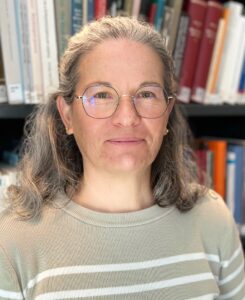
Medievalists know that textual traditions are unstable, but when looking at Parcevals saga or at the Strengleikar, scholars are confronted with a particularly complex situation, having to look at the French texts as well as the Scandinavian ones. Not only are the manuscripts numerous and sometimes hard to access, but the codicological, cultural, and linguistic backgrounds also differ. These difficulties may be strictly philological to begin with, but whether one is aware or not, they influence one’s choices. For instance, which edition of the Conte du Graal should be chosen? Many of these questions have to be addressed in a similar way, whether the aim is to compare Parcevals saga and Chrétien’s poem, translate the latter into a modern language, or produce a school edition, because there is no standard edition of the Conte du Graal.
France, the country where the philologist Joseph Bédier presented his theories on editing medieval texts, is also the country where the policy of editing a text from a unique manuscript has been most predominant. This, in turn, has led to long-running debates and sometimes “raging wars” on editorial issues. In this talk, I will look back at the long-running editorial debate which has characterised the study of Chrétien de Troyes.
Hélène Tétrel is professor of medieval literature and language at the University Rouen-Normandie, department of French language, literature and comparative Literature, and member of the research laboratory CEREdI. She works on the translated sagas and has recently published an edition and a study of Breta sögur (La Saga des Bretons, Paris: Classiques Garnier, 2021). She is currently working on a collaborative project on the Conte du Graal and the Parcevals saga.
Fyrirlesturinn verður haldinn á ensku og er öllum opinn. / The talk will be delivered in English and is open to all.
—o—o—o—
